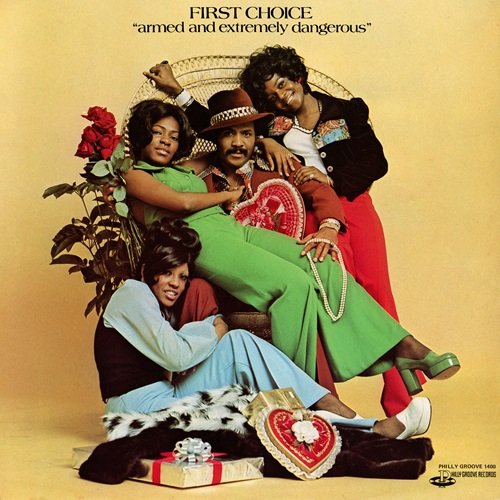Powered by the robust lead voice of Rochelle Fleming, First Choice were key to the disco movement and well-established years before the style went mainstream. The Philadelphians scored their first hit in 1973 with "Armed and Extremely Dangerous," a Top 40 pop single aided by long-term collaborators Norman Harris and Allan Felder. After they placed four additional singles in the Top 40 of the R&B chart, the group's already-considerable value to DJs and clubbers increased dramatically. A series of Top Ten disco singles included "Doctor Love," the lead single from 1977's Delusions, an album full of lyrically rich dance tunes as well as luscious ballads that showcased Fleming as one of the era's most distinctive vocalists. Having recorded six LPs, the group broke up in 1980. Shep Pettibone's 1983 remix of the anthemic Delusions cut "Let No Man Put Asunder" renewed commercial interest in a group whose importance to underground club music never waned and has only intensified with time. First Choice's recordings have inspired multiple generations of house producers, and they've been sampled, interpolated, and covered by an innumerable quantity of artists spanning hip-hop, R&B, and many styles of dance music.
First Choice were originally known as a teenaged vocal group named the Debonettes. Rochelle Fleming, Annette Guest, Malanie McSears, and Wardell Piper, classmates at Philadelphia's Overbrook High School, performed locally and were introduced to songwriter/arranger/producer Norman Harris and writing partner Allan Felder by WDAS disc jockey Georgie Woods. After McSears married and left the group, Fleming, Guest, and Piper made their recorded debut as First Choice in 1972 with "This Is the House (Where Love Died)," issued on Scepter. Signed to Philly Groove, the women broke through the following year with "Armed and Extremely Dangerous." Written by Harris and Felder, the song reached number 11 on Billboard's R&B chart and crossed over to number 28 on the pop chart. It was also a Top 20 U.K. hit. Subsequent singles "Smarty Pants" and "Newsy Neighbors" also charted Stateside -- the former went to number nine in the U.K. -- and were featured on the album Armed and Extremely Dangerous. The singers were backed on the sessions by the tight rhythm section of guitarist Harris, bassist Ron Baker, and drummer Earl Young, who were part of MFSB, the house band for Gamble & Huff's Philadelphia International Records. Piper left for a solo career before the release of the LP and was replaced by Joyce Jones.
"The Player," the group's first single with Jones, was their highest-performing single on the R&B chart, hitting number seven (number 70 pop). The album of the same title reached number 36 on the R&B chart with an additional push from the number 19 R&B single "Guilty," a song originally recorded by the U.K. duo the Pearls. Like Armed and Extremely Dangerous, The Player was produced by Harris and Philly Groove co-founder Stan Watson. First Choice then entered a joint arrangement with Philly Groove and major-label Warner Bros., and again changed membership with Jones' vacated role filled by Ursula Herring. (Jones would resurface at the end of the decade with a pair of singles on the Queen Constance label.) So Let Us Entertain You, the third album from First Choice, was issued in 1976. Still produced by Harris and Watson, First Choice became a regular presence on Billboard's disco chart with the album's "First Choice Theme"/"Ain't He Bad" and "Are You Ready for Me?" altogether reaching number seven, and "Gotta Get Away (From You Baby)" registering at number 16.
Norman Harris launched his Gold Mind imprint under New York's Salsoul Records, and brought First Choice with him. The group recorded three albums for the label. Delusions and Hold Your Horses, respectively issued in 1977 and 1979, each yielded a Top Ten disco single. The ultra-catchy "Doctor Love," off the former, narrowly missed the pop Top 40, and was trailed by the appropriately galloping title song from the latter. Delusions also contained the anthemic "Let No Man Put Asunder," which would prove to be the group's most enduring song after its 1983 Shep Pettibone remix was released by Salsoul proper. Hold Your Horses finished strong with "Love Thang" and "Double Cross" becoming deep disco classics. Breakaway, released in 1980, featured Debbie Martin in place of Ursula Herring, who had left the previous year. Harris and several of his associates assisted the trio on their last album, which was highlighted by "Breakaway" itself, another tough dancefloor track a commanding Fleming vocal.
First Choice split shortly thereafter. In 1985, Rochelle Fleming (credited as Roshelle Fleming) teamed with Greg Carmichael and Patrick Adams to record "Love Itch," a solo single issued on Prelude. Two years later, Fleming put together a new version of First Choice with cousin Laconya Fleming and Lawrence Cotell, though that lineup didn't release any material. Annette Guest, subsequently known as Annette Guest-Hardeman and Annette Hardeman, put in extensive work as a session background vocalist and co-wrote songs including Stephanie Mills' number one R&B hit "I Feel Good All Over" (1987) and Miki Howard's number two R&B hit "Love Under New Management" (1989). Ursula Herring recorded as one-third of Urmadré. Fleming, Guest, Herring, and Wardell Piper reunited in 2014 for a one-off performance at a Salsoul celebration. Guest and Herring continued to lead First Choice as a performing act well into the 2020s.




